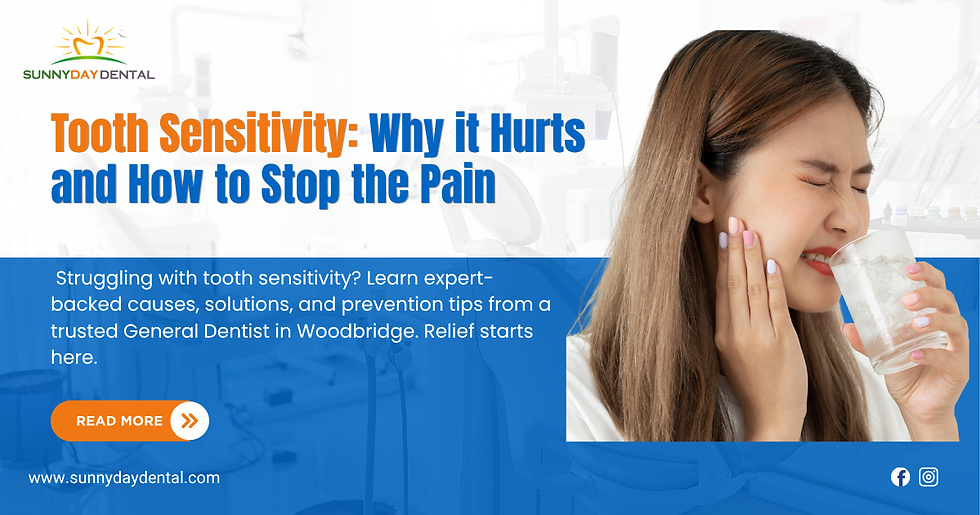How Regularly Should You Get Your Teeth Cleaned?
- Sunny Day Dental
- Mar 17
- 4 min read

Maintaining a healthy and radiant smile requires more than just daily brushing and flossing. Professional teeth cleaning plays a crucial role in ensuring optimal oral health. But how often should you visit your dentist for a professional cleaning? This comprehensive guide will answer that question and explore the importance of teeth cleaning while offering practical insights to keep your smile bright and healthy.
Why Is Professional Teeth Cleaning Necessary?
Even with meticulous at-home oral hygiene, plaque and tartar buildup are inevitable. These stubborn deposits harbor bacteria, leading to cavities, gum disease, and bad breath. Regular dental cleaning in Brampton eliminates plaque and tartar, reducing the risk of serious dental conditions.
Benefits of Regular Teeth Cleaning:
Prevents cavities – Plaque is the leading cause of tooth decay. Professional cleaning removes hidden plaque and protects your enamel.
Reduces gum disease risk – Gingivitis, the first stage of gum disease, can be reversed with regular dental visits.
Prevents bad breath – Halitosis is often caused by bacteria buildup; regular cleaning keeps your breath fresh.
Detects dental issues early – Dentists can spot potential problems, such as cavities and early gum disease, before they worsen.
Enhances overall health – Studies show that poor oral health is linked to heart disease, diabetes, and respiratory issues.
How Often Should You Get Your Teeth Cleaned?
The American Dental Association (ADA) and the Canadian Dental Association (CDA) recommend professional teeth cleaning at least twice a year for most people. However, specific factors can influence how frequently you should schedule a visit:
1. Your Oral Health Condition
Healthy Individuals: If you have good oral hygiene and no significant dental issues, a cleaning every six months is sufficient.
Gum Disease Patients: If you have gingivitis or periodontitis, your dentist may recommend a cleaning every three to four months.
Individuals with Braces or Dental Work: People with orthodontic devices, crowns, or implants may need more frequent cleanings to prevent plaque accumulation.
2. Lifestyle Factors
Smokers – Tobacco use increases plaque buildup, requiring more frequent dental cleanings.
High Sugar Diets – Frequent consumption of sugary or acidic foods leads to faster plaque buildup, demanding more regular visits.
Diabetic Patients – Diabetes affects oral health, necessitating more frequent cleanings to prevent infections.
What Happens During a Professional Teeth Cleaning?
A typical teeth cleaning appointment consists of several steps to ensure optimal oral health:
Oral Examination – The dentist examines your teeth and gums for signs of decay, gum disease, and other concerns.
Plaque & Tartar Removal – A scaler is used to remove hardened tartar that cannot be eliminated with brushing alone.
Deep Cleaning & Polishing – A high-powered electric brush and gritty toothpaste polish your teeth to remove stains.
Flossing & Rinsing – Professional flossing reaches areas that daily flossing might miss.
Fluoride Treatment (Optional) – Strengthens enamel and provides long-term cavity protection.
Signs You Need a Dental Cleaning Sooner Than Scheduled
While routine cleaning is recommended twice a year, some signs indicate you might need an appointment sooner:
Persistent bad breath despite brushing
Bleeding gums when flossing or brushing
Increased tooth sensitivity
Noticeable plaque buildup or yellowish teeth
Experiencing pain or swelling in gums
If you notice any of these symptoms, schedule an immediate dental cleaning in Brampton to prevent serious complications.
At-Home Dental Care Tips Between Professional Cleanings
While professional cleanings are essential, maintaining oral hygiene at home is equally important:
Brush twice daily using fluoride toothpaste and a soft-bristled toothbrush.
Floss daily to remove plaque between teeth.
Use mouthwash to kill bacteria and freshen breath.
Limit sugary foods that contribute to plaque formation.
Drink plenty of water to wash away food particles and bacteria.
How Often Should You Get a Teeth Cleaning?
How often should you get your teeth cleaned? Most dentists recommend professional teeth cleaning every six months to prevent cavities and gum disease. However, individuals with underlying dental conditions or lifestyle factors may require more frequent cleanings, every 3-4 months.
FAQs
1. Can I skip a professional teeth cleaning if I brush and floss daily?
Even with excellent oral hygiene, plaque and tartar can still form in hard-to-reach areas. Professional teeth cleaning ensures these are thoroughly removed to prevent cavities and gum disease.
2. Is teeth cleaning painful?
For most people, professional teeth cleaning is not painful. However, if you have sensitive gums or excessive tartar buildup, you may experience mild discomfort, which your dentist can minimize with proper techniques.
3. What happens if I don’t get my teeth cleaned regularly?
Skipping professional teeth cleaning can lead to plaque buildup, gum disease, cavities, and even tooth loss in severe cases. It can also contribute to bad breath and overall poor oral health.
4. How long does a professional dental cleaning take?
A standard teeth cleaning session typically lasts between 30 to 60 minutes, depending on the amount of plaque and tartar buildup.
5. Can teeth cleaning whiten my teeth?
While teeth cleaning removes surface stains and polishes your teeth, it is not a substitute for professional teeth whitening. However, regular cleaning can help maintain a brighter smile over time.




Comments